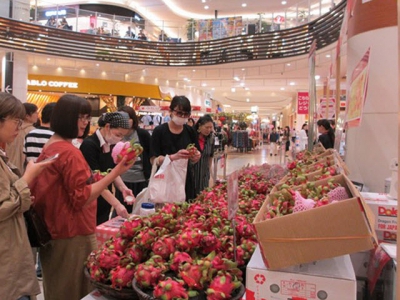Japanese firms look to expand investment in Vietnams agriculture

In the first nine months of 2019, 48 Japanese enterprises have invested in Vietnam’s agriculture sector with registered capital of US$270 million.
The agricultural sector in Vietnam has huge advantages in terms of market scale and growth, low labor cost and stable political-socio environment, said Kazuko.
Kazuko added the fact that both Vietnam and Japan are members of the Comprehensive and Progressive Trans – Pacific Partnership (CPTPP) would open doors for cooperation.
More importantly, Vietnam is expected to enjoy Japanese commitment in opening its market. The import tariffs for Vietnam’s key agricultural exports to Japan, including coffee, cashew, pork, honey, wood, among others would see significant reductions.
In 2018, Vietnam’s trade turnover with Japan reached US$37.9 billion, accounting for 7.9% of the country’s total trade revenue. During the period, bilateral trade turnover of agricultural products stood at US$3 billion. In the first eight months of 2019, the figure was US$1.9 billion.
In the first nine months of 2019, 48 Japanese enterprises have invested in Vietnam’s agriculture with registered capital of US$270 million.
Nevertheless, Kazuko said challenges for Vietnamese agricultural products in penetrating Japanese market are equally huge.
According to Kazuko, Vietnam’s processing sector face difficulties of insufficient infrastructure and human resources, while the government has not provided necessary incentives for enterprises producing high quality products.
This would require better policies and mechanism from the government for the business community, Kazuko said.
Yuichiro Shiotani, CEO of AEON Vietnam said advanced technologies in processing products are necessary to add greater value in bilateral agricultural trade in between Vietnam and Japan.
Shiotani referred to the quality of Cat Chu mango from Dong Thap province which is lower than those from Taiwan, the Philippines, Thailand and Pakistan.
Shiotani added Pakistan’s mango is cheap but is more delicious than those from other countries in AEON’s distribution network, due to the unique technique from Pakistan’s farmers, not to mention modern processing and storage technologies.
Representatives of Japanese enterprises said Vietnam would have better opportunities to export agricultural products to Japan if local enterprises invest in storage and processing technologies.
Vice Minsiter of Agricultural and Rural Development Tran Thanh Nam said both Vietnam and Japan have their own advantages with unique agricultural products, so there would be no competition between the two countries.
Nam stated the ministry is willing to be the coordinator for Japanese companies investing in Vietnam, while continue to promoting trade activities between Vietnamese and Japanese enterprises.
Related news
 Price of white-flesh dragon fruit soars
Price of white-flesh dragon fruit soars White-flesh dragon fruit from the Mekong Delta province of Tien Giang has seen a recent exponential price rise with the food produce being valued
 Method to turn ag waste into renewable fuel being tested
Method to turn ag waste into renewable fuel being tested Engineer testing method that could cut cost of collecting and delivering corn plant material for making ethanol by 20%.
 Pepper exports: Decreases in almost all markets, opportunities in the EU
Pepper exports: Decreases in almost all markets, opportunities in the EU In order to take advantage of opportunities to promote exports to the EU as well as other markets, the pepper industry needs to change drastically and overcome